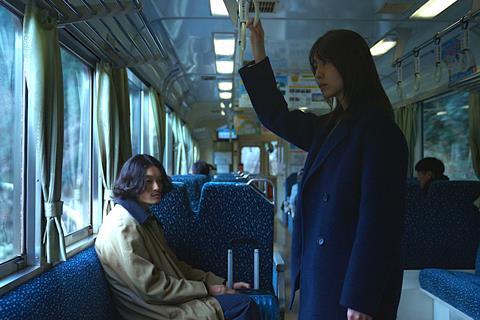Cinematographer Du Jie makes his directorial debut with this enigmatic Japanese ghost story

Dir/scr: Du Jie. Japan. 2024. 100mins.
The lives of two young couples glance off each other in this lightly haunted tale of suicide, love and loss. Enigmatic and elliptical, The Height Of The Coconut Trees manages to find some resonance on an emotional level, even when its deliberately loose and time-shifting structure makes the story difficult to follow.
Narrative shortcomings
Despite its narrative shortcomings, the visuals from Chinese-born writer/director Du Jie – who makes his feature directorial debut here and also takes on cinematography, editing and production design duties – are as graceful and inventive as you might expect from an established cinematographer with the likes of Moon Man and The Wasted Times on his CV. His love of imagery also explains one of the film’s major preoccupations: the taking of photographs and philosophical questions related to it. The cinematography is likely to be the main selling point for other festivals after its world premiere in Busan’s New Currents.
At the centre of much of the narrative is a young man (Soichiro Tanaka) who has lost his keen photographer girlfriend (Mado Karasumori) to suicide. Episodes involving the pair on holiday are woven through the story, which also charts what has happened since her death. The drama’s other chief focal point is the relationship between a pet shop worker (Minami Ohba) and her fish factory worker boyfriend (Seita Shibuya) who, near the start of the film, plan to wed after he unexpectedly finds a ring inside a fish he is gutting.
This fable-like aspect introduces an otherworldly dimension to the film, as we will ultimately learn the full life cycle of this ring and meet the ghost of the man who once owned it. Ghosts in Du’s world are employed sparingly for melancholic rather than horror purposes, and have an appearance as corporeal as the living.
The filmmaker often seems more interested in assembling his existential argument than in connecting the dots between his various narrative pieces. In fact, he celebrates transitions, rather than destinations, with several scenes taking place on moving trains – liminal spaces that offer the possibility of unexpected connection which his camera captures dappled with light. Key moments also occur where there is a transient image, such as a reflection, overlaying what is being observed. One of his characters talks about the traces of souls being captured on film and there’s a sense of Du himself attempting this, often wanting to catch the impressionistic suggestion of an emotion rather than anything more concrete.
Beyond the look, the sound design from Zhe Li shoulders a lot of the mood. There are frequent instances of one of the characters counting back in a whisper for reasons that are left unexplained but that suggest the transience of time, and the film periodically falls completely silent for emotional emphasis.
Grieving for two different sorts of lost love moves the film away from the city streets of Tokyo to the forested Shikoku Island, where the coconut trees of the title grow, as Du amps up his ruminations on suicide, the motivations behind it and the rights and wrongs of intervention. The ensemble cast offer sensitive performances, but the writer/director is so concerned with exercising his philosophical muscle that the living characters’ hopes and desires are less fleshed out than they might be. Du proves his abilities in all areas and takes on big themes in artistic fashion, but perhaps a larger team of collaborators would have helped him streamline his story into a more easily decipherable shape.
Production companies: D Union Film
International sales: D Union Film, dunionfilm@gmail.com
Producers: Du Jie, Kazu Fukui, Lili Chen
Cinematography: Du Jie
Production design: Du Jie
Editing: Du Jie
Music: Mulian Chen
Main cast: Minami Ohba, Soichiro Tanaka, Seita Shibuya, Mado Karasumori
























